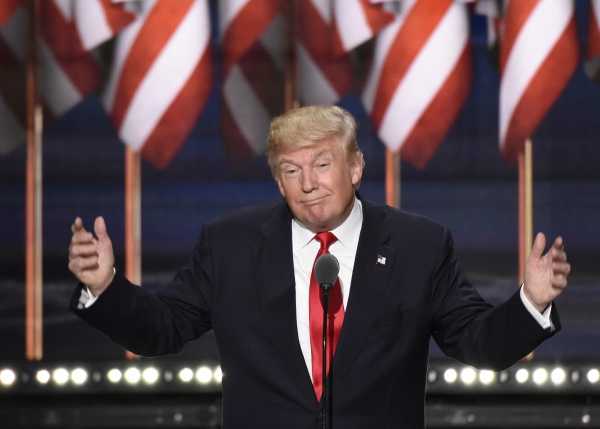
The past 24 hours of news in President Donald Trump’s various legal imbroglios — the replacement of outgoing lawyer Ty Cobb with Emmet T. Flood, who represented Bill Clinton during his impeachment as president, and the admission of Rudy Giuliani to Sean Hannity (subsequently confirmed by Trump on Twitter) that Trump did in fact reimburse Michael Cohen for a $130,000 payment made to porn actress Stormy Daniels on the eve of the 2016 election — are powerful reminders of something that can’t be said often enough: Trump and his White House lie all the time, without apparent compunction.
Giuliani’s admission was shocking because it revealed the lie: Trump’s April claim that he knew nothing about Cohen’s $130,000 payment to Daniels. Compared to that revelation — which has obvious consequences for the ongoing legal battle between Daniels and Trump — the lawyer shake-up and the lies it revealed may seem like small ball. But that’s the point: The president and his administration lie about things big and small alike, simply because they can.
In March, Maggie Haberman and Michael S. Schmidt of the New York Times reported that Trump had interviewed Flood, and that Cobb was expected to leave in the coming weeks. Cobb was on the team representing Trump in his personal capacity to special counsel Robert Mueller’s investigation into Russia’s involvement in the 2016 presidential election and potential obstruction of justice by Trump as president.
At the time of the Times’s report, Trump denied vociferously that he was considering adding Flood to his team of personal lawyers, and said he was “VERY HAPPY” with Cobb and the rest of his team.
But on Wednesday, the White House announced what Trump had denied, adding Flood to his legal team. Meanwhile, Cobb announced that he was retiring, implying it was due to his health; Giuliani, whom Trump added to his team in April, said Cobb’s departure was in part due to the desire for a more aggressive approach to standing up to the Mueller probe.
Trump and the White House called the initial report fake news. But the facts appear to be that Trump interviewed Flood, denied that he was considering hiring Flood once the Times reported it, then went ahead and did it anyway.
Don’t treat White House denials as if they mean anything, because they don’t
This has all happened before. Trump’s White House is so resistant to confirming things reported by media outlets they dislike that they’re more likely to change their own plans than to acknowledge that a report might be true.
Consider what happened with Secretary of State Rex Tillerson. Last fall, press outlets reported that Trump wanted to fire Tillerson and replace him with then-CIA Director Mike Pompeo. Trump dismissed the reports as “fake news” and said he and Tillerson got along fine.
Then in March, Donald Trump announced he was firing Tillerson and nominating Pompeo instead.
In the wake of Tillerson’s firing, the Washington Post confirmed that this had been the plan all along — but that the press reports accurately describing the plan had caused Trump to hold off:
Later that week, rumors swirled that Trump might fire several more Cabinet officials — and multiple outlets confirmed Trump had already decided to fire National Security Adviser H.R. McMaster. White House press secretary Sarah Huckabee Sanders denied the reports. Six days later, McMaster was fired and replaced with John Bolton.
The lesson to take away from this is not that all the things the New York Times and Washington Post (the two outlets whose reporting on the Trump beat has been most consistently reliable) write might happen in the Trump administration are definitely going to happen. After all, the president is known to say different things to different people about what he’s going to do — something the Post has called “keeping people off kilter” but could just as easily be described as spreading misinformation — even within his administration.
But it does mean that the White House appears to see absolutely nothing wrong with denying that Trump is considering taking some action, even when he is in fact considering that action, and even if he will after the denial proceed to take that action — and even if lying about it would have adverse consequences for Trump and the White House in the future.
It’s not news to most people following this administration that Trump lies. But it can be hard to accept it as muscle memory.
Most politicians have learned to lie in particular ways. They give statements that appear to deny something while leaving themselves enough wiggle room so that if they’re later caught, they can claim nothing they said was technically untrue. They simply refuse to comment on stories that uncover embarrassing truths. They try not to lie about things where the lie could be easily exposed — say, lying about potential personnel changes in the coming weeks — or when there are actual legal stakes involved.
News consumers have learned these parameters and use them to judge which stories and claims they believe. When the subject of a news story denies the story, consumers have a natural reflex to view that story with a little more skepticism; to parse the wording of the denial to see if there’s space for both the story and denial to be accurate; or even to shrug it off as an unknowable he said/she said.
With their actions, Trump and his White House have forfeited the right to have any influence on which stories about the president should or should not be believed. If they have no scruples about when and about what to lie, the only responsible alternative is to assume, always, that their statements have no relationship whatsoever to the truth.
Sourse: vox.com






